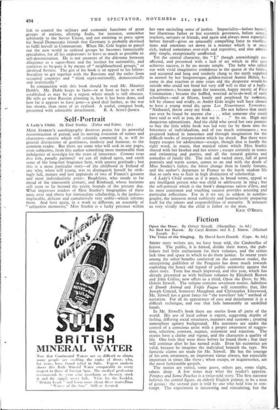Self-Portrait
A Lady's Child. By Enid Starkie. (Faber and Faber. Iss.) MISS STARKIE'S autobiography deserves praise for its powerful reconstruction of period, and its moving evocation of scenes and characters—merits which will certainly commend it, as will its general distinctions of gentleness, modesty and humour, to the common reader. But there are some who will seek in any pages, even subjective, from this author something more memorable than indulgence of nostalgia for the years of innocence. Comme vous etes loin, paradis parfume! we can all indeed agree, and catch some of the long-lost fragrance here, with uneasy gratitude ; but this is a more particular story—of the childhood in Ireland of one who, when still young, was to distinguish herself by strik- ingly full, mature and just appraisals of two of France's greatest and most individualistic poets: Baudelaire, who strode so far ahead of the nineteenth century, and Rimbaud, whose horizons still seem to lie beyond the poetic bounds of the present day. What impresses readers of Miss Starkie's biographies of these men, over and above her immaculate scholarship, is the justice— implacable, delicate and cumulatively very noble—which informs them. And here again, in a work so different, an assembly of " subjective memories," Miss Starkie is a lucky prisoner within
her own encircling sense of justice. Impartiality—before herself, her illustrious father or her eccentric governess, before sisters, teachers, servants or friends, and again and always most especially before herself—gives an unusually compelling force to recollec- tions and emotions set down in a manner which is at once rich, indeed sometimes over-rich and repetitive, and also admir- ably simple, exceptionally unaffected.
Yet the central character, the " I," though astonishingly un- affected, and presented with a lack of art which in this case achieves success, is by no means simple. The baby who called out with vivid imaginative confidence to the queen of the fairies, and accepted and long and tenderly clung to the myth supplied in answer by her Sargentesque, golden-haired Auntie Helen, be- came in due reaction at nine years old the desperate would-be suicide who could not bend her very stiff will to that of a bully- ing governess ; became again the innocent, happy mystic of First Communion ; became the baffled, worried ne'er-do-well of early schooldays—and at fifteen, lonely and perplexed by isolation, fell by chance and avidly, as Andre Gide might well have chosen to have a young mind do, upon Les Nourritures Terrestres. "Nathaniel, throw away my book. . . . Do not believe that truth can ever be found by anyone else . . . what someone else could have said as well as you, do not say it. . . ." So on. High and dangerous admonitions. And the child who saved her rare pennies to buy the little white book was led very far by them into the bitterness of individualism, and of too much seriousness ; was prepared indeed in innocence and through imagination for the difficult works of interpretation which lay ahead. But there were happy escapes for adolescence—escape, though that is hardly the right word, in music, that musical talent which Miss Starkie shared with her brother and her sisters ; escape certainly in tennis and swimming and parties, and all the natural gaieties and comedies of family life. The rich and varied story, full of good portraits and warm scenes, comes to an end with the death of Miss Starkie's father, the bitter change then in family fortune, and the author's departure to France to the harsh student life that so early was to fruit in high distinction of scholarship.
A Lady's Child seems as if it must, in broad terms, appeal to any intelligent person who was child or adolescent in 1914 ; but the self-portrait which is the book's dangerous raison d'être, and its most consistent and touching success provides arresting and particular reflections. For in it we see, as seldom in autobio- graphy, the innocent mind ruthlessly and humourlessly preparing itself for the talents and responsibilities of maturity. It instructs us very vividly that the child is father to the man.
KATE O'BRIEN.


























 Previous page
Previous page